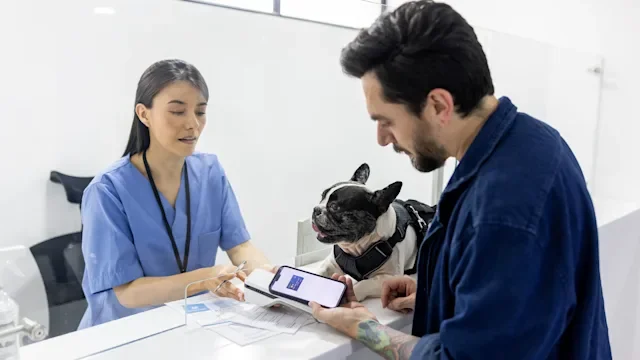Key takeaways:
Donna Spinella’s pet chicken Trisha almost died from a mysterious tongue infection.
At one point, Trisha swallowed her own tongue.
Donna kept Trisha alive by administering a variety of medications for 2 months.
When Donna Spinella decided to start raising chickens at her home in upstate New York, she did her homework. For 6 months, she read everything she could about the birds.
In September 2022, she brought home four adorable 1-week-old chicks.
“They had sort of started developing feathers, but they still had mostly chick fuzz,” she says.
Search and compare options
They weren’t old enough to regulate their body temperature yet, so they lived in a brooder box that kept them warm. Around Halloween, they moved into their outdoor coop full time. All the chicks, including one named Trisha, appeared to be doing well.
Then, on November 14, everything changed.
A sudden illness in the chicken coop
Early that Monday morning, Donna went outside to the coop to start her daily tasks. She immediately noticed that Trisha was lying on the floor on her side.
“I saw her move, so I knew she wasn’t dead,” Donna recalls. “I grabbed her, wrapped her in my jacket, and ran inside the house, screaming for my husband.”
Donna sobbed while calling her aunt, who also raised chickens. Her aunt told her: “This is why you should always get more chickens than you want. They’re fragile and susceptible. One day they’re fine, and the next they’re on the brink of death.”
She encouraged Donna to keep the chicken warm until it inevitably passed. Donna responded: “No. I don't accept that.”


Instead, she and her husband, Vince, began working the phone until they found an avian vet who could see Trisha right away. But the chicken had to stay alive long enough to get there.


Ultimately, the vet determined that Trisha was starving to death because her tongue was infected. It was swollen, covered with lesions, and taking up most of her mouth — blocking her from swallowing any nutrients.
Read more like this
Explore these related articles, suggested for readers like you.
“The vet was like, ‘I’ve never seen anything like this,’” Donna says. “As we were leaving, she said, ‘I gotta tell you, I don’t even think you’re going to make it home. I was just like, ‘Well, I’m going to try.’”
Continued care — and a financial toll
Trisha immediately began an intensive treatment program. She had to take a variety of medications to help her tongue infection: meloxicam, clavamox, and Bactrim. She also needed a prescription food called EmerAid Intensive Care Omnivore Powder.
Life soon revolved around caring for Trisha, who moved into Donna’s house. During the first weeks of the chicken’s recovery, Donna and Vince gave Trisha syringes of her special food at 6AM. Then, at noon, Trisha got more food, as well as syringes of medication. At 6PM, she’d get food again, and then at midnight, more food and medication.
Trisha was so weak that she didn’t fight the humans opening her mouth to give her syringes. Either Donna or Vince would hold the bird and open her mouth, while the other inserted the medication.
This around-the-clock regimen persisted for months. On New Year's Eve, Donna and Vince had plans to travel to a casino about 2 hours away. They couldn’t figure out how to make the trip work, because Trisha still needed nearly constant care.
“So we took our chicken to New Year’s Eve,” Donna says with a laugh. Trisha spent the evening in a Pack 'n Play in the couple’s hotel room.

Trisha had clearly become a full-fledged member of the family. She pecked on Vince’s keyboard as he worked from home. She hopped up on the bathroom counter as Donna was curling her hair. Yet the chicken’s care was also taking a financial toll. Between vet appointments and medication, Donna estimates she spent close to $1,500 keeping Trisha alive.
To help cover these costs, Donna got creative. She sold four tickets she had managed to snag to Taylor Swift’s sold-out Eras Tour and earned back almost all the money she had spent on Trisha. It felt like fate: During Trisha’s first week of recovery, Donna played Swift’s album “Midnights” on repeat. She now considers the chicken a bona fide Swiftie.
A jarring development
Over the course of 2 months, Trisha gained weight and got healthier. But her tongue remained swollen and covered with lesions. That prevented Trisha from eating on her own.
“The only reason she was alive was because we were essentially force-feeding her,” Donna says.
At 10PM on January 8, 2023, Donna and her husband started Trisha’s nightly feeding. As they opened her beak, Vince said: “I feel like her tongue is floating around.” Still, the couple put the first syringe into Trisha’s mouth, and then closed her beak so she would swallow. When they opened her beak back up, they didn’t see a tongue.
Vince made an alarming observation: “I think she swallowed her tongue.” With that news, Donna passed out, collapsing onto the floor. “The concept was so disgusting to me — this thing rotting off, and her swallowing it,” she recalls.
Trisha’s vet was speechless. It turned out that the chicken’s tongue tissue was so damaged that it needed to die off in order for the infection to clear. Once the tongue was gone, it was no longer blocking Trisha’s throat, and the chicken began thriving. She continued to live inside Donna’s home until the spring, when the temperature warmed up, and she now happily spends her days in the outdoor coop.
“She’s adapted to life without a tongue,” Donna says. It doesn’t prevent the bird from doing anything she needs to do: She can eat, drink, and make noises like all the other chickens.
When the vet determined that Trisha no longer needed ongoing care, and the chicken left for the last time, everyone in the office stood up and clapped.
“The receptionists, the techs, everyone came out to send her off,” Donna says. “I started crying. It was one of the happiest days of my life.”
Another milestone soon followed: A couple months after losing her tongue, Trisha laid her first egg.
Hope for others who love their backyard chickens
According to the 2021-2022 American Pet Products Association National Pet Owners Survey, around 10.6 million U.S. households have backyard chickens. Donna says she hopes that Trisha’s experience can be an inspiration for anyone else whose chicken develops health problems.

“I would say first and foremost, don’t give up,” she says. “I think it’s 90% willpower and hope, and 10% your ability to actually medicate and provide care.”
Keeping a positive outlook is essential, she adds, because chickens can and do defy the odds.
Trisha was once given a 1% chance of surviving — and now she’s thriving.
“Some vets would have put her down,” Donna adds. “If you feel in your heart of hearts that there is something else that can be done, find the people who are willing to do it.”

Why trust our experts?





















